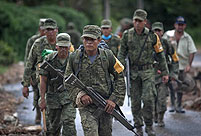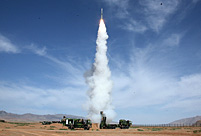German Chancellor Angela Merkel is highly likely to form a coalition with her party's biggest center-left rival, analysts said, after Monday's provisional results showed her bloc achieving a stunning victory, just five seats short of an absolute majority in the lower house.
Although the new government's China policy may remain stable, regardless of which party or parties form a coalition with Merkel, analysts said that additional efforts were needed to improve China's ties with Germany and the European Union.
Top leaders from Merkel's bloc and those from the biggest rival Social Democratic Party of Germany all advocate a China-friendly policy, said Gu Junli, a German studies researcher at the Chinese Academy of Social Sciences.
"Germany plays a dominating role in promoting China-EU ties within the union. ... Berlin can contribute more to removing the differences over trading issues, including solar energy products, between China and EU."
Berlin can also play a more positive role in conducting EU-China negotiations on an investment agreement, he added.
"With the experience gathered during her last two terms, Merkel has deepened her understanding of China and Chinese core interests," said Liu Liqun, a professor of German studies at Beijing Foreign Studies University.
"This will help her better deal with China issues in her new term," he said.
Liu sees the stable development of China-Germany cooperation in all fields including economics, politics, education and people-to-people exchanges.
"There won't be big twists and turns for China-Germany ties," he added.
Merkel's conservative bloc gained 41.5 percent of the vote, the best result since 1990, German media reported.
Premier Li Keqiang on Monday congratulated Merkel on her bloc's victory in the country's federal election, calling for deepened ties between the two countries.
"As strategic partners, China always attaches importance to developing relations with Germany and is willing to work with German government to foster true friendship," he said during a phone call with Merkel.
French President Francois Hollande, who has at times been at odds with Merkel over her tough austerity policies for Europe, was the first leader to telephone after poll estimates showed her with a clear win, one of his aides said.
European Council President Herman Van Rompuy also congratulated Merkel on Sunday and her alliance of conservative Christian Democrats and their Bavarian sister party the Christian Social Union.
"I am confident that Germany and its new government will continue its commitment and contribution to the construction of a peaceful and prosperous Europe at the service of all its citizens," he said, adding that he was looking forward to continuing the close cooperation with Merkel.
Without a majority of the parliament seats, Merkel's bloc has to find a partner to form a coalition to rule Europe's largest economy for the next four years.
"It is highly likely that a 'grand coalition' will be formed by Merkel's bloc and its rival Social Democratic Party of Germany," Gu said.
There have been two such grand coalitions in history, so German politicians have experience of such a governmental pattern, he added.
The SPD gained 192 of the 630 seats of the Lower House of parliament, known as Bundestag, while the Free Democratic Party, Merkel's current junior coalition partner, failed to retain seats in the parliament with a disappointing result of 4.8 percent - under the 5-percent minimum support to enter into the parliament.
FDP leader Philipp Roesler offered to step down from the post on Monday.
Mo Jingxi, Xinhua and AFP contributed to the story.
zhouwa@chinadaily.com.cn
 Storms leave 97 dead, 58 missing in Mexico
Storms leave 97 dead, 58 missing in Mexico New model of indigenous surface-to-air missiles testfired
New model of indigenous surface-to-air missiles testfired  118.28-carat diamond to be auctioned in HK
118.28-carat diamond to be auctioned in HK Maternal love under streetlight
Maternal love under streetlight Naked foreign student sits in the middle of a road in Haikou
Naked foreign student sits in the middle of a road in Haikou  Colorful Yunnan: Enjoy the natural beauty
Colorful Yunnan: Enjoy the natural beauty Harbin named Chinese city with most beautiful women
Harbin named Chinese city with most beautiful women New college students' military training in Guangzhou
New college students' military training in Guangzhou Rugby girls
Rugby girls PLA's 38th Group Army conduct training
PLA's 38th Group Army conduct training Residences of the royal house of Savoy
Residences of the royal house of Savoy The last days of Wan Aihua
The last days of Wan Aihua Highlights at 12th National Games of China
Highlights at 12th National Games of China Beijing Film Academy welcomes freshmen
Beijing Film Academy welcomes freshmen Large mahjong party sets new world record
Large mahjong party sets new world recordDay|Week|Month